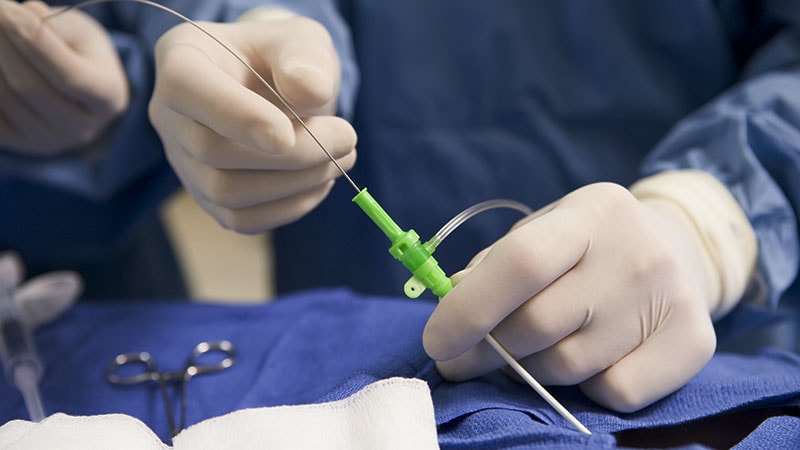Core Concepts
Interventional cardiologists experience significant physiological stress during complex PCI procedures.
Abstract
The study focused on the physiological stress experienced by interventional cardiologists during complex percutaneous coronary intervention (PCI) procedures, specifically in the context of coronary total occlusion (CTO) interventions. The research highlighted the increased heart rate and blood pressure parameters observed during CTO PCI compared to regular work and non-CTO interventions. The study aimed to shed light on the occupational hazards faced by operators performing complex PCI procedures, emphasizing the need for further research and monitoring in this area.
Key Highlights:
Physiological stress in interventional cardiologists during complex PCI procedures
Higher heart rate and blood pressure during CTO PCI compared to regular interventions
Continuous stress until the end of CTO PCI, especially during failed attempts
Lack of data on the impact of PCI on cardiologists' stress levels
Study conducted on five experienced CTO operators without cardiovascular issues
ABPM measurements recorded during various procedures, showing increased HR and MAP during CTO PCI
Significantly higher HR during CTO PCI compared to non-CTO interventions
Importance of monitoring stress in interventional cardiologists performing complex PCI procedures
Complex PCI Tied to Physiological Stress Among Operators
Stats
"The HR and MAP during CTO PCI exceeded the HR and MAP during regular work by 20.1% and 8.2%, respectively, and by 11.1% and 3.1%, respectively, during non-CTO interventions."
"There was also a significant increase in HR (P = .002) but not in MAP relative to the duration of CTO PCI."
"The CTO PCI procedure was associated with significantly higher HR compared with ST-segment elevation myocardial infarction PCI (87 vs 79 beats/min; P < .001), and failed CTO PCI showed significantly higher HR compared with successful CTO PCI (90.7 vs 85.9 beats/min; P < .001)."
Quotes
"I was flabbergasted that the heart rate increased continuously until the very end of CTO PCI, rather than until the very moment of CTO recanalization, which is perceived as the most difficult part of this procedure." - Maksymilian P. Opolski, MD, PhD
Key Insights Distilled From
by Megan Brooks at www.medscape.com 03-12-2024
https://www.medscape.com/viewarticle/complex-pci-tied-physiological-stress-among-2024a10004ng
Deeper Inquiries
What are the potential long-term health implications for interventional cardiologists experiencing high levels of stress during complex PCI procedures?
The potential long-term health implications for interventional cardiologists experiencing high levels of stress during complex PCI procedures can be significant. Prolonged exposure to stress can lead to various health issues such as hypertension, cardiovascular diseases, and mental health disorders like anxiety and depression. The constant physiological stress experienced during complex PCI procedures, as highlighted in the study, can put a strain on the cardiovascular system, leading to an increased risk of developing heart-related conditions. Additionally, the mental stress and pressure can impact overall well-being, potentially leading to burnout and decreased job satisfaction among operators.
How can the findings of this study be used to improve the well-being of operators performing challenging PCI interventions?
The findings of this study can be utilized to improve the well-being of operators performing challenging PCI interventions by raising awareness about the physiological and mental stress they experience during these procedures. By acknowledging the impact of stress on operators' health, hospitals and healthcare institutions can implement measures to support interventional cardiologists better. This may include providing access to mental health resources, offering stress management programs, promoting a healthy work-life balance, and ensuring adequate rest periods between procedures. Additionally, incorporating regular health check-ups and monitoring for operators involved in complex PCI procedures can help in early detection and prevention of potential health issues.
How can the medical community better support interventional cardiologists facing occupational stress and its impact on their health and performance?
The medical community can better support interventional cardiologists facing occupational stress and its impact on their health and performance by implementing comprehensive wellness programs tailored to the specific needs of these professionals. This can involve providing access to counseling services, stress management workshops, and mental health resources. Hospitals and healthcare institutions can also prioritize creating a supportive work environment that promotes open communication, teamwork, and a culture of well-being. Additionally, scheduling practices can be optimized to allow for adequate rest periods and workload distribution to prevent burnout. Regular monitoring of operators' health and well-being, as highlighted in the study, can help in identifying early signs of stress-related issues and intervening promptly to ensure the long-term health and performance of interventional cardiologists.
0
